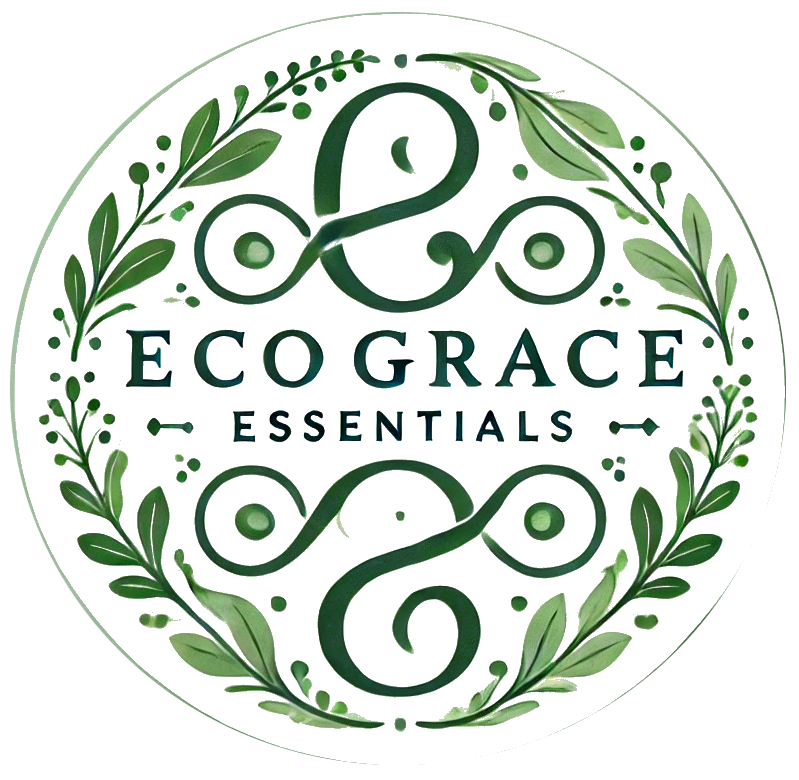Zero-Plastic Grocery Shopping: Simple Tips for a Sustainable Lifestyle

Plastic pollution has reached critical levels, and most of it comes from our everyday habits—like grocery shopping. Every time we grab a plastic bag or buy a pre-packaged product, we add to the growing plastic problem. Fortunately, adopting a zero-plastic grocery shopping routine can make a huge difference. This guide will show you how to reduce plastic waste in your weekly grocery trips, from picking sustainable alternatives to making eco-friendly choices.
1. Bring Reusable Shopping Bags
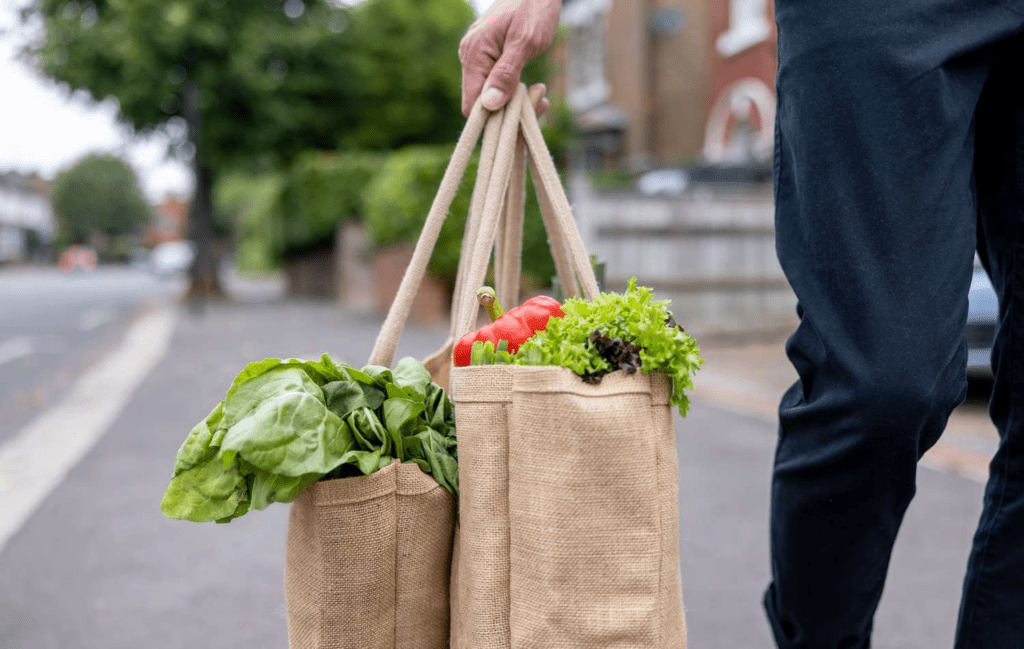
The first step to zero-plastic shopping is bringing your own reusable shopping bags. Plastic bags are one of the biggest contributors to pollution, and they take hundreds of years to break down. Here’s how to make the switch:
- Types of reusable bags: There are plenty of options out there, from simple cloth totes to bags made from recycled materials. Look for bags that are durable, washable, and large enough for your typical grocery hauls.
- Mesh produce bags: Instead of using those flimsy plastic produce bags for fruits and vegetables, switch to reusable mesh produce bags. They’re lightweight, breathable, and can be thrown in the wash after each use.
- Foldable bags: For convenience, choose foldable bags that fit in your car or purse. That way, you’re never caught without a reusable bag when you make an unplanned stop at the store.
- Pro tip: Some grocery stores even offer discounts when you bring your own bags. Over time, this can lead to savings while helping reduce plastic use.
Reusable Bag Costs and Savings Table
| Bag Type | Average Cost | Lifespan | Savings Over Time (per year) |
|---|---|---|---|
| Cloth Tote Bag | $5-$15 | 3-5 years | $20-$50 |
| Recycled Material Bag | $7-$20 | 4-6 years | $25-$60 |
| Mesh Produce Bags (set) | $10-$15 | 3-5 years | $15-$30 |
| Foldable Nylon Bags (set) | $10-$18 | 2-4 years | $20-$40 |
2. Opt for Bulk Shopping
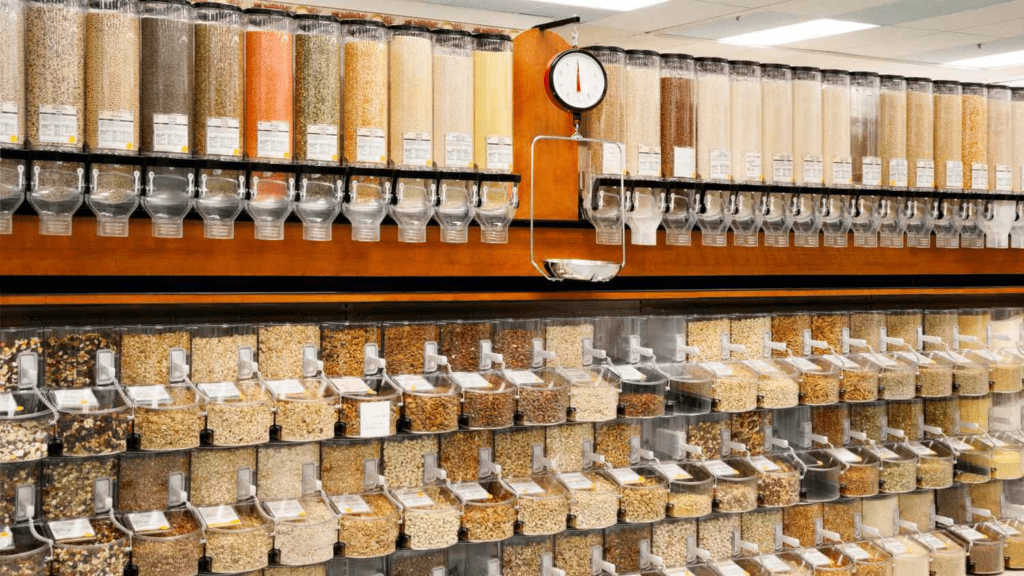
Another effective strategy is buying in bulk. Many bulk stores allow you to bring your own containers, which drastically cuts down on packaging waste. You’ll find grains, spices, nuts, seeds, and snacks in bulk, often at cheaper prices compared to pre-packaged items.
- How to prepare for bulk shopping: Bring glass jars, cloth bags, or stainless steel containers when visiting bulk stores. Before filling, weigh your containers (this is called “tare weight”) so the store can subtract their weight from the total.
- Common bulk items to buy: Flour, rice, beans, pasta, nuts, dried fruit, herbs, and spices. Bulk shopping helps cut down on unnecessary packaging while allowing you to buy only the quantities you need.
- Pro tip: Bulk shopping apps can help you locate nearby stores that offer zero-waste shopping options. This makes it easier to find plastic-free groceries in your area.
3. Shop at Farmers’ Markets
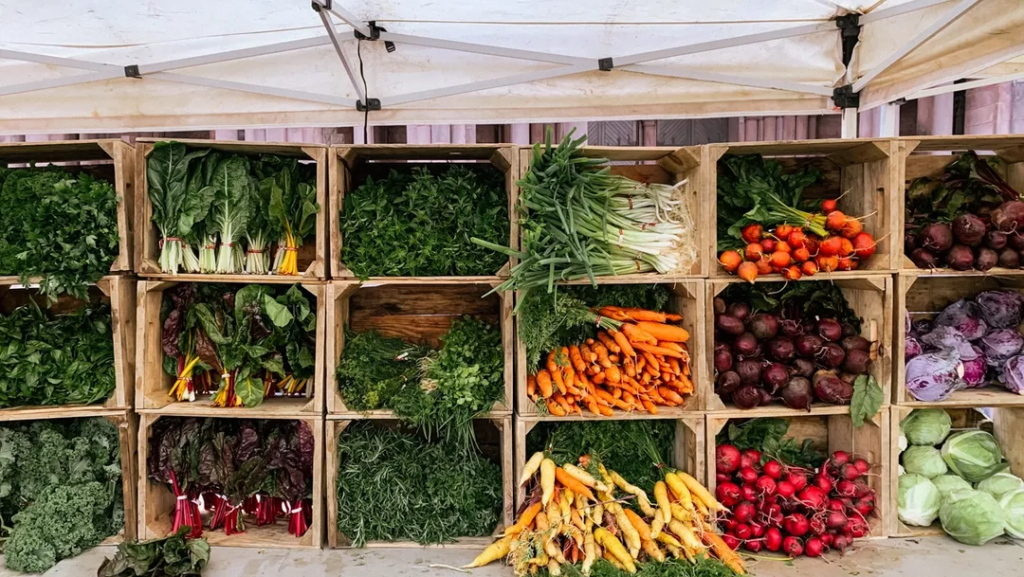
Farmers’ markets are ideal for reducing plastic waste because you’ll find fresh, locally-sourced produce without the layers of plastic wrap. Not only do these markets offer seasonal fruits and vegetables, but you’re also supporting small, local businesses.
- Bring your own containers: Use cloth or canvas totes, mesh bags, and glass jars for items like berries, greens, and baked goods. Some vendors might even offer discounts for bringing your own packaging.
- Advantages of farmers’ markets: Since most of the items are grown locally, they don’t come pre-packaged in plastic, and you’re likely to find fresher produce than what’s available in grocery stores.
- Building relationships with farmers: Many farmers offer CSA (Community Supported Agriculture) boxes that provide weekly deliveries of fresh, plastic-free produce straight to your door. This not only reduces plastic but also supports a sustainable food system.
4. Plastic-Free Produce and Dairy
A key part of zero-plastic shopping is avoiding plastic-wrapped produce and opting for fresh, unpackaged fruits and vegetables. Additionally, you can switch to plastic-free dairy by choosing items packaged in glass bottles or reusable containers.
- What to look for: When buying produce, always look for items that are sold loose instead of pre-packaged. This applies to everything from tomatoes to bananas.
- Reusable egg cartons: Many farmers’ markets and zero-waste stores allow you to bring your own egg cartons for refills. Simply return your old carton each week for a fresh dozen.
- Glass milk bottles: Some stores offer milk in returnable glass bottles, which can be reused and sterilized, eliminating the need for plastic milk jugs.
5. DIY Reusable Storage Containers
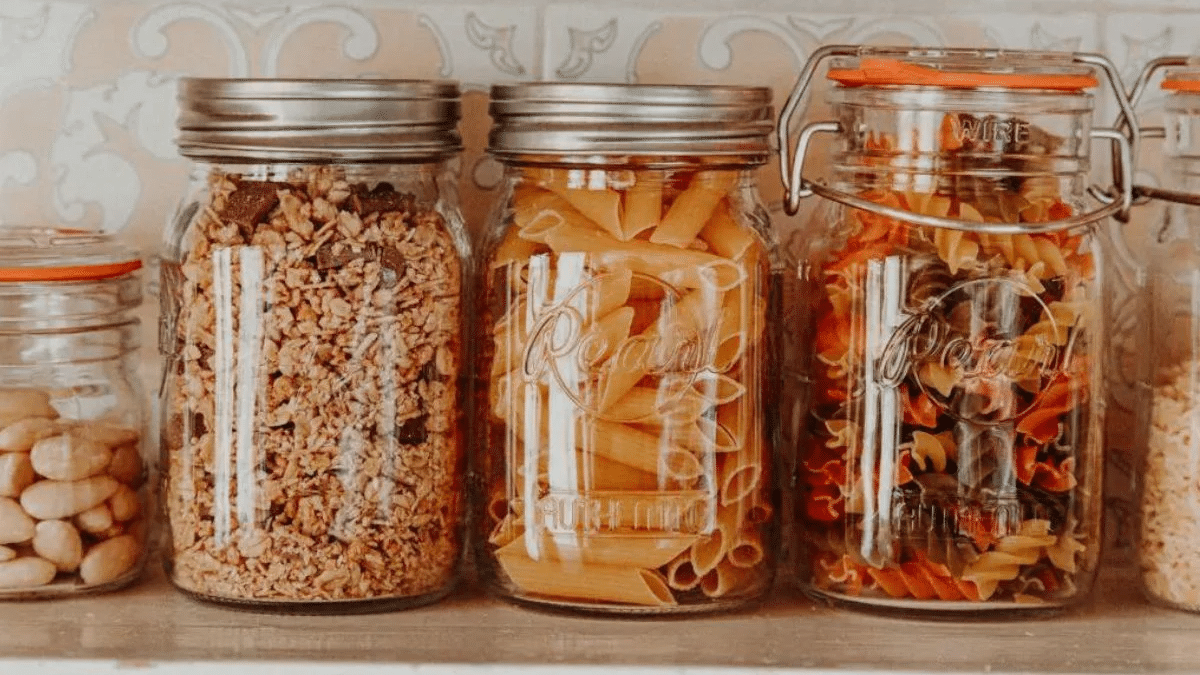
Once you’ve made your plastic-free purchases, you’ll need to store your groceries in a sustainable way. Instead of using plastic containers or wrap, opt for eco-friendly alternatives.
- Glass jars: Use mason jars to store dry goods like grains, nuts, and pasta. These jars are durable and can be reused for years.
- Beeswax wraps: These wraps are a great alternative to plastic wrap for storing cheese, covering bowls, or wrapping sandwiches. Made from organic cotton and beeswax, they are washable and last for up to a year.
- Silicone food bags: For items like fresh produce or leftovers, switch to reusable silicone bags. These bags are freezer-safe, easy to clean, and eliminate the need for single-use plastic bags.
6. Compostable and Sustainable Packaging
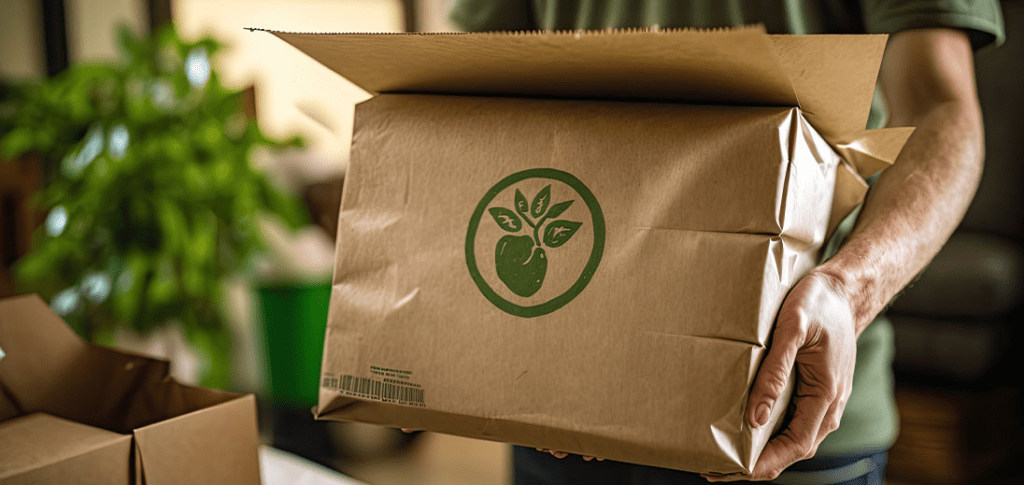
When plastic-free isn’t an option, look for compostable packaging. Many companies are moving toward eco-friendly packaging materials that break down naturally, including compostable plastics made from cornstarch and other plant-based materials.
- What is compostable packaging? Compostable packaging is designed to break down into natural elements in a compost environment, leaving no toxic residues. Look for labels like “compostable” or “biodegradable” to ensure you’re making the right choice.
- Examples of compostable packaging:
- Paper or cardboard cartons for eggs or milk.
- Compostable sandwich bags made from plant-based materials.
- Bakery goods in biodegradable wrappers.
- Pro tip: Start composting at home! Use kitchen scraps, food waste, and any compostable packaging to feed your compost bin. Not only does this reduce your waste, but it also creates nutrient-rich soil for your garden.
7. Eco-Friendly Family Involvement
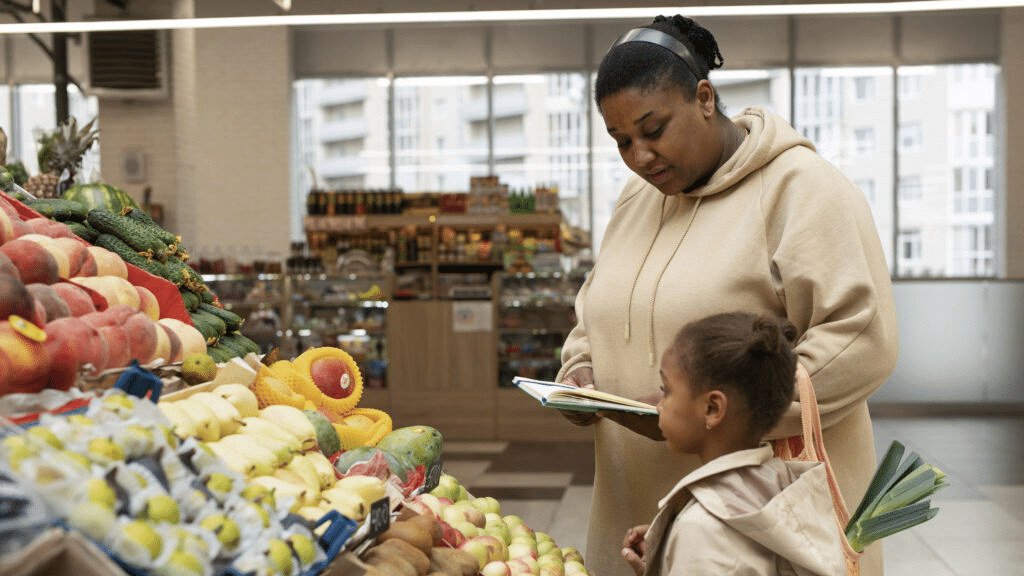
Getting the whole family involved in zero-plastic grocery shopping helps make the transition easier and more enjoyable. Here’s how to make it a fun, educational experience for everyone:
- Make it a challenge: Turn it into a family competition. Keep track of how much plastic you’re avoiding each week, and reward the family with a fun eco-friendly activity, like a nature hike or picnic.
- Teach kids about the environment: Help them understand the impact of plastic on the planet. For instance, explain how plastic bags harm sea turtles or how recycling helps reduce waste. Involve them in choosing reusable bags or planning bulk shopping trips.
- Eco-friendly crafts: Turn old containers or leftover jars into fun DIY projects. Kids can decorate their own glass jars for storing snacks or create beeswax wraps with simple home kits.
12 More Zero-Plastic Grocery Shopping Ideas
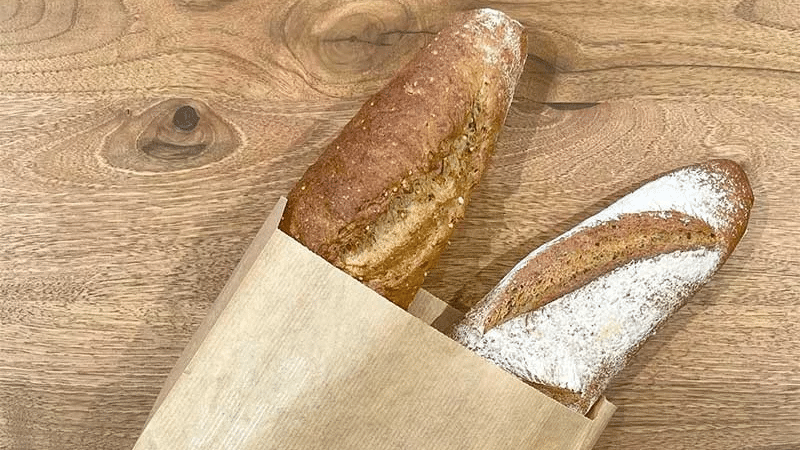
- Opt for Fresh Baked Goods in Reusable Bags: Many bakeries allow you to bring your own cloth bread bags or containers to take home freshly baked items, reducing plastic usage.
- Choose Concentrated Products: Instead of buying larger plastic bottles, opt for concentrated products, like laundry detergent or cleaners, that come in smaller packaging and require dilution at home.
- DIY Cleaning Supplies: Purchase bulk ingredients for homemade cleaning products and store them in reusable glass jars. This reduces the need for single-use plastic bottles of cleaning supplies.
- Use Reusable Silicone Food Covers: Replace plastic cling film with silicone food covers that are washable and reusable, perfect for covering leftovers or wrapping items.
- Buy Frozen Items in Paper Packaging: Some frozen vegetables and fruits are available in paper-based or compostable packaging, which cuts down on single-use plastic.
- Join a Local Food Co-op: Many co-ops encourage members to bring their own containers and bags and often offer a wider range of plastic-free products than traditional supermarkets.
Reuse glass food jars for storage instead!

- Swap Dairy Packaging: Some stores offer milk and yogurt in glass containers that can be returned and reused, reducing plastic waste from dairy products.
- Plastic-less Meat: Ask your butcher or fishmonger to wrap purchases in paper or bring your own container.
- Grow Your Own Herbs: Skip the plastic-packaged herbs from the store and grow your own at home. This not only reduces packaging waste but also ensures a constant fresh supply.
- Support Companies Offering Plastic-Free Rewards Programs: Some companies reward customers who return packaging or opt for plastic-free choices with discounts or other perks.
- Pick Non-Plastic Wrapped Ice Cream or Frozen Desserts: Some brands offer ice cream in paper or glass packaging. Look for these eco-friendly alternatives at local markets.
- Reusable Herb and Spice Jars: Instead of continuously buying herbs and spices in small plastic containers, buy them in bulk and refill your reusable jars.
Conclusion: Start Your Zero-Plastic Journey Today
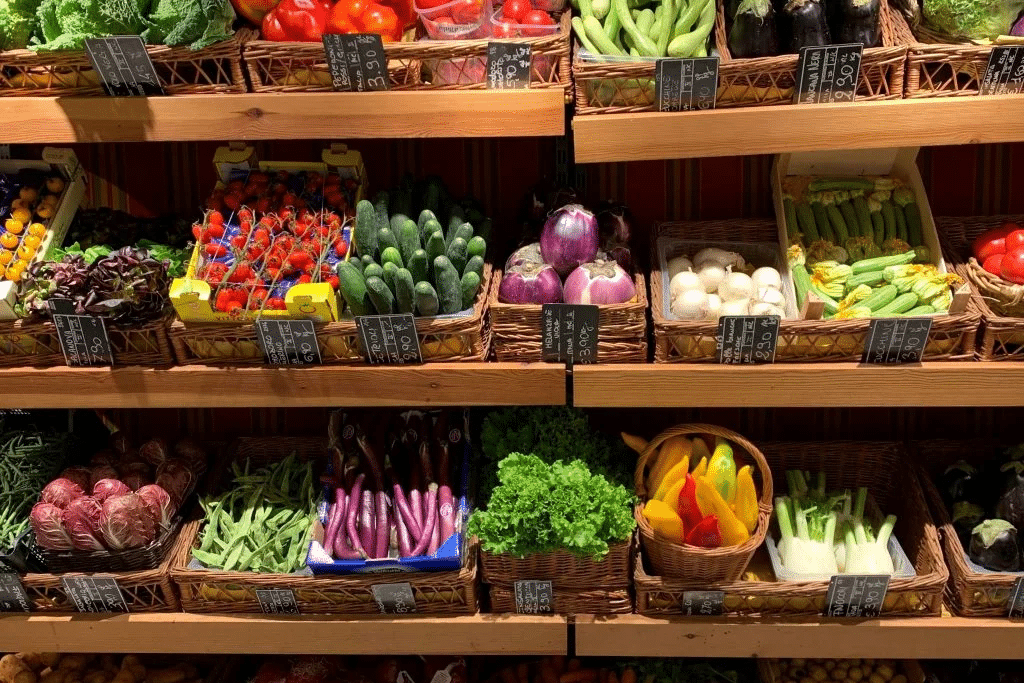
Switching to zero-plastic grocery shopping is one of the simplest and most effective ways to reduce waste, and it doesn’t have to be complicated. Start by making small changes, like bringing your own reusable bags, skipping plastic produce bags, and choosing packaging that’s easier to recycle or reuse.
Every action helps, even if it’s small. For example, opting for glass containers or jars at bulk stores, or using cloth bags for fruits and veggies. When you shop consciously, you’re taking a stand against single-use plastic, and those small changes add up.
Next time you’re at the store, think about how much less plastic you can use. And remember—your choices make a real difference. It’s all about creating new habits that become second nature, so shopping more sustainably feels less like a challenge and more like the new normal.
